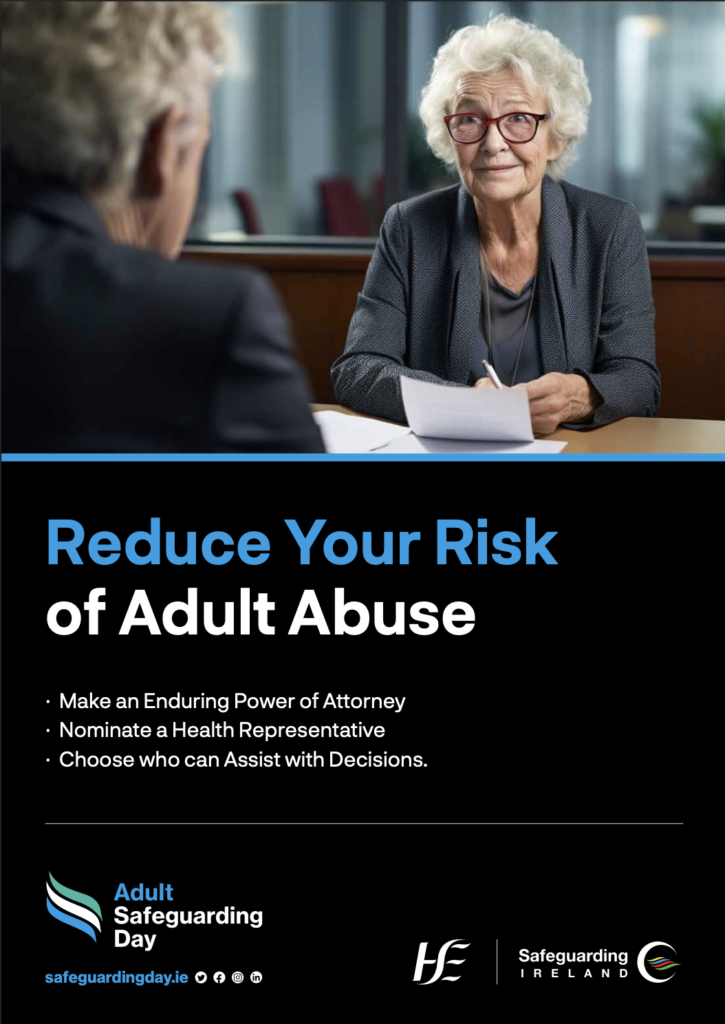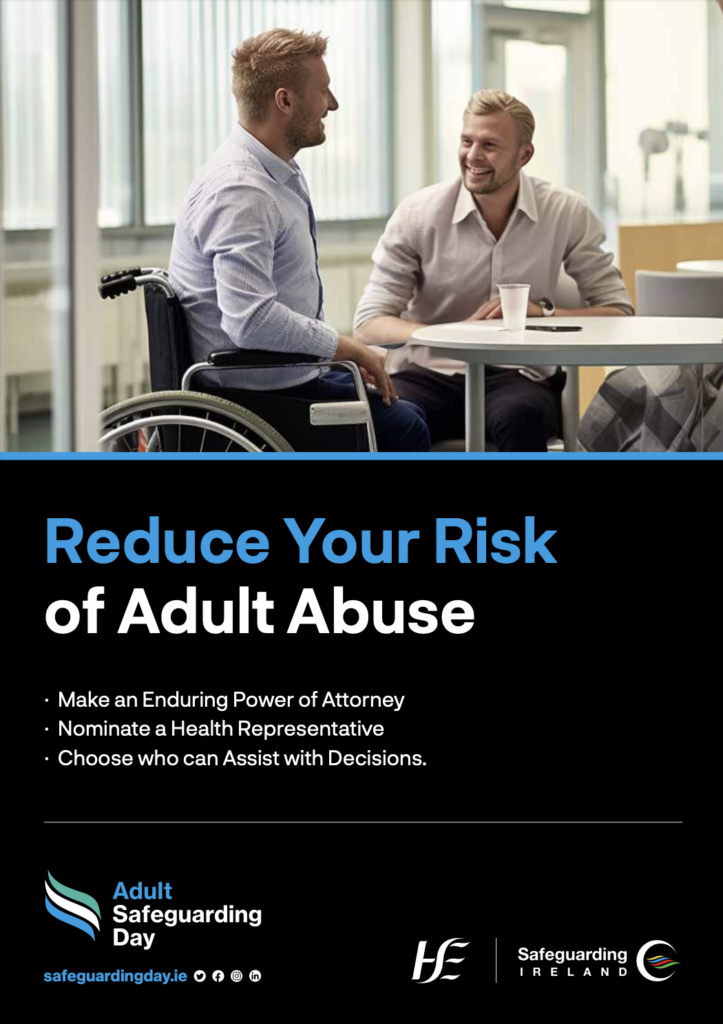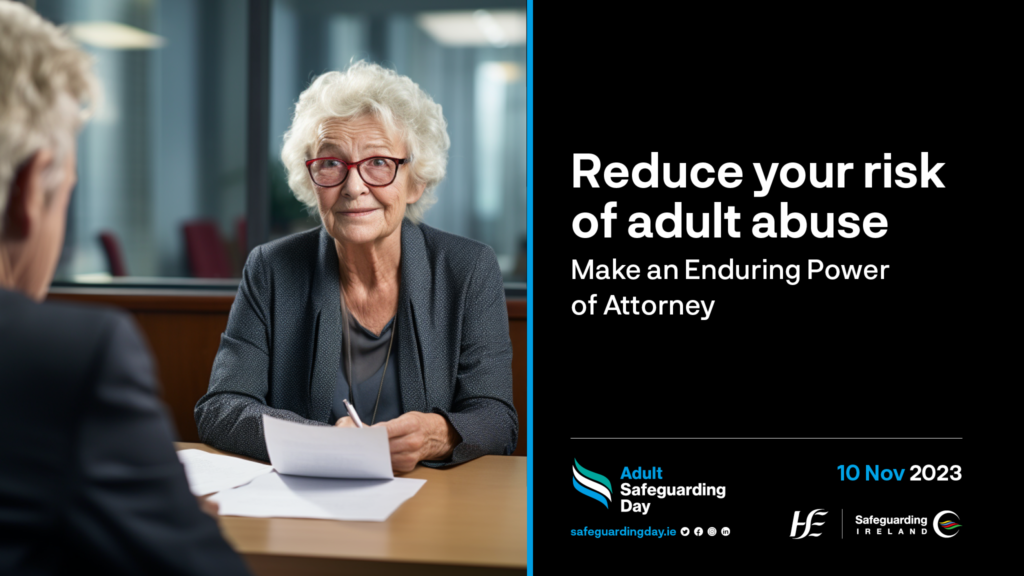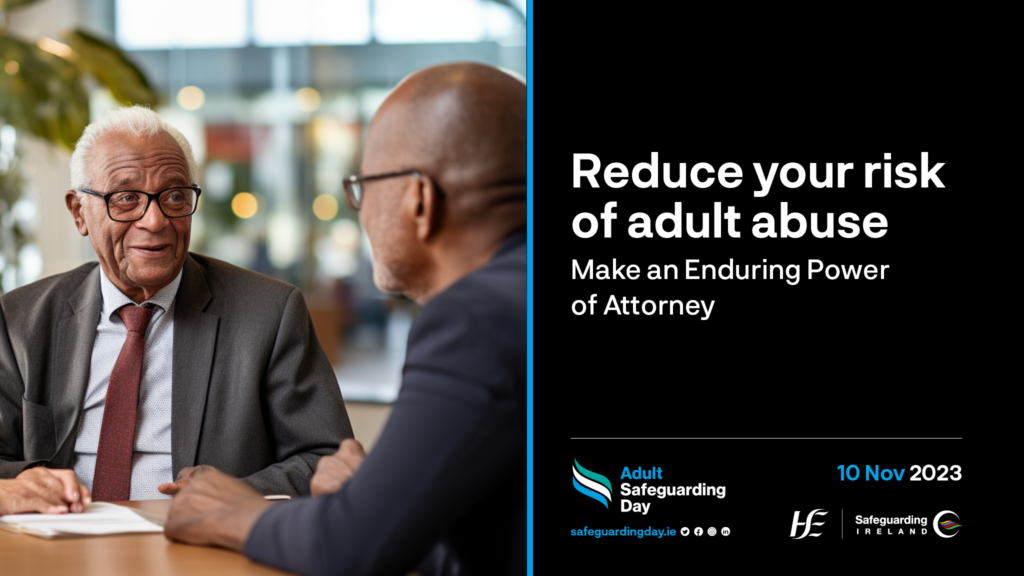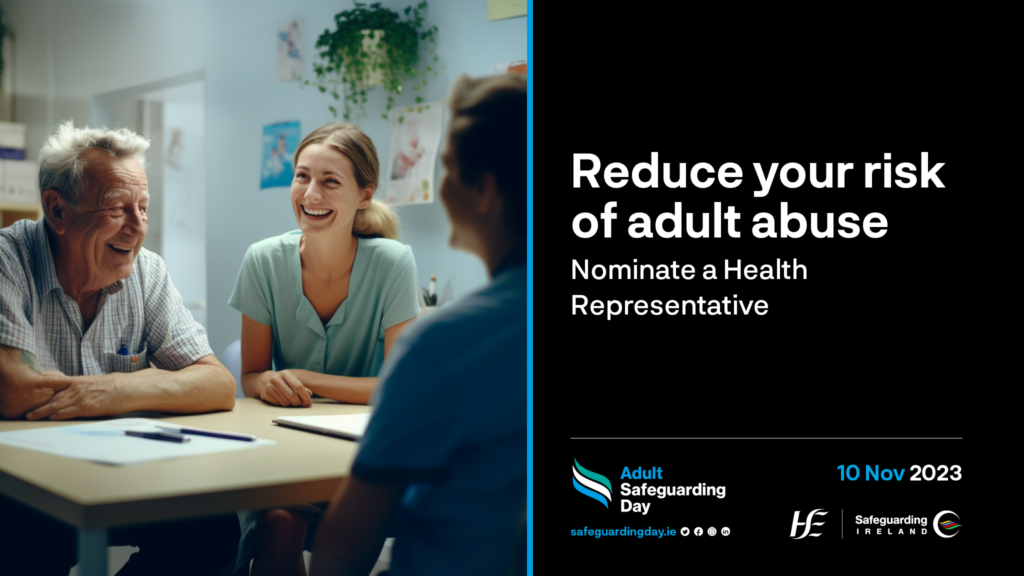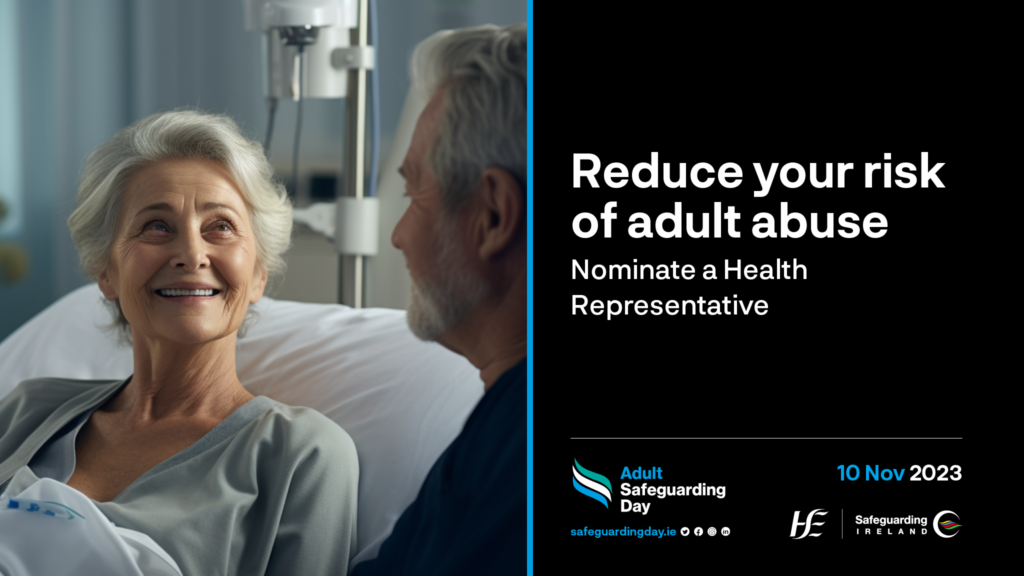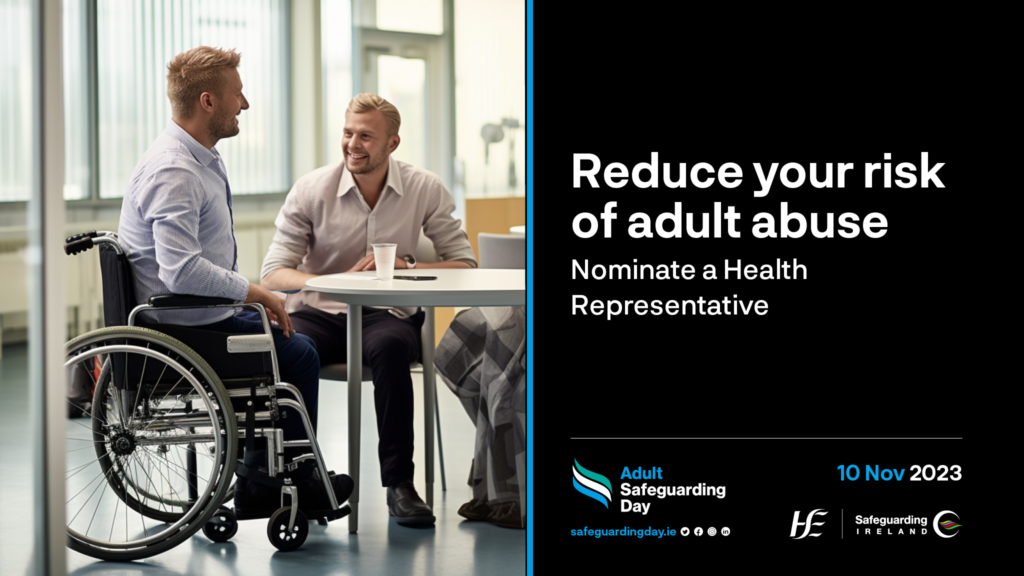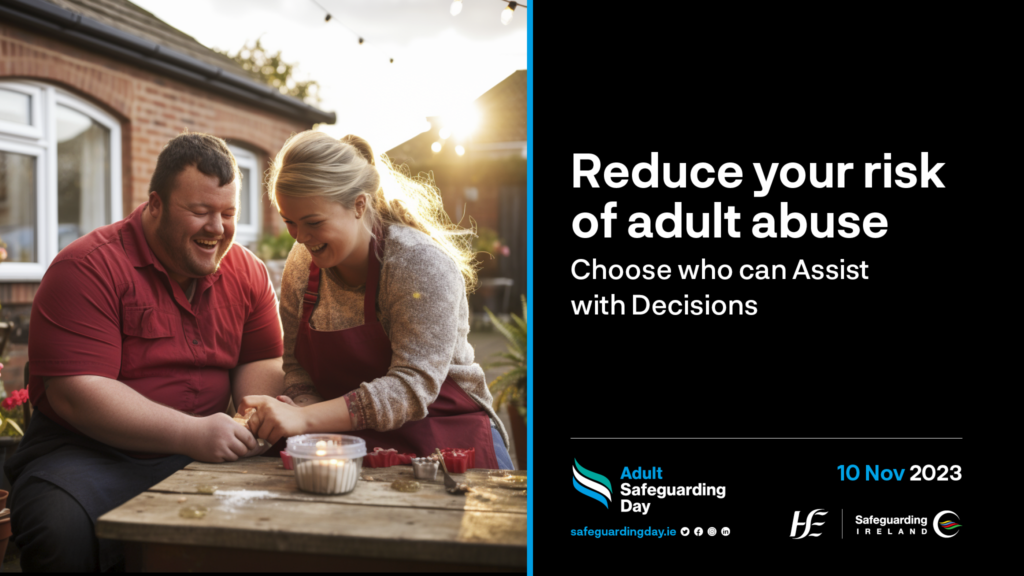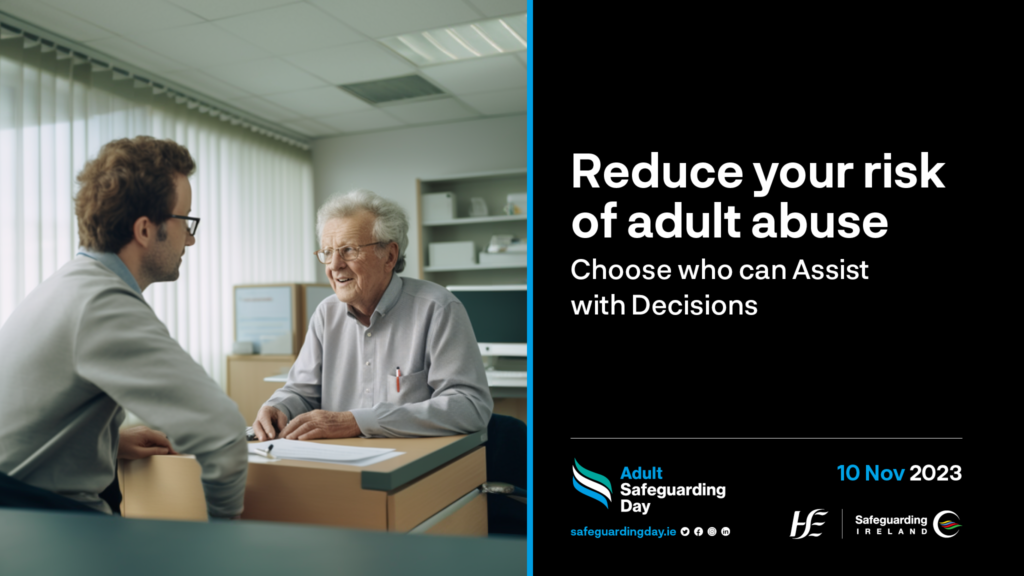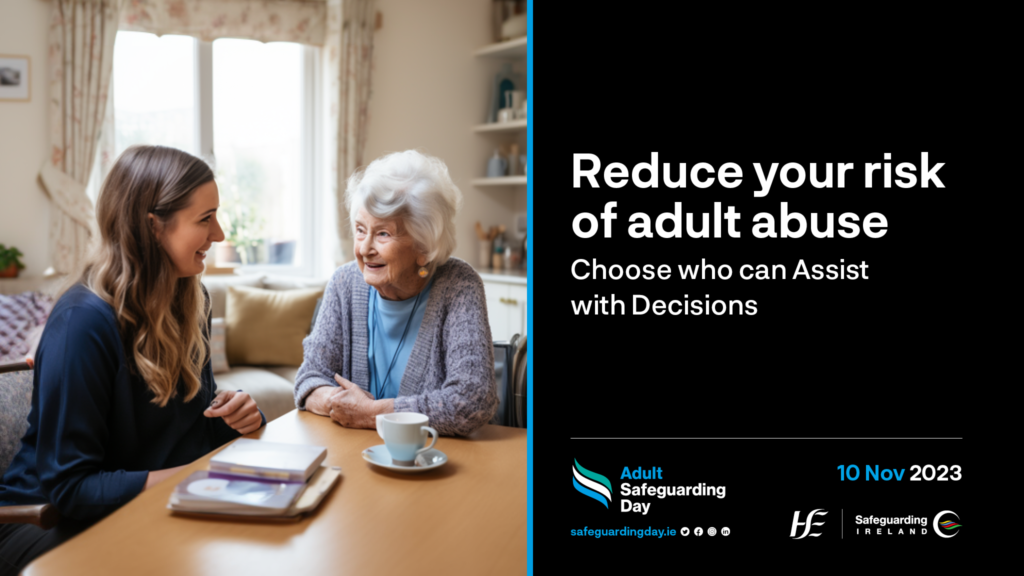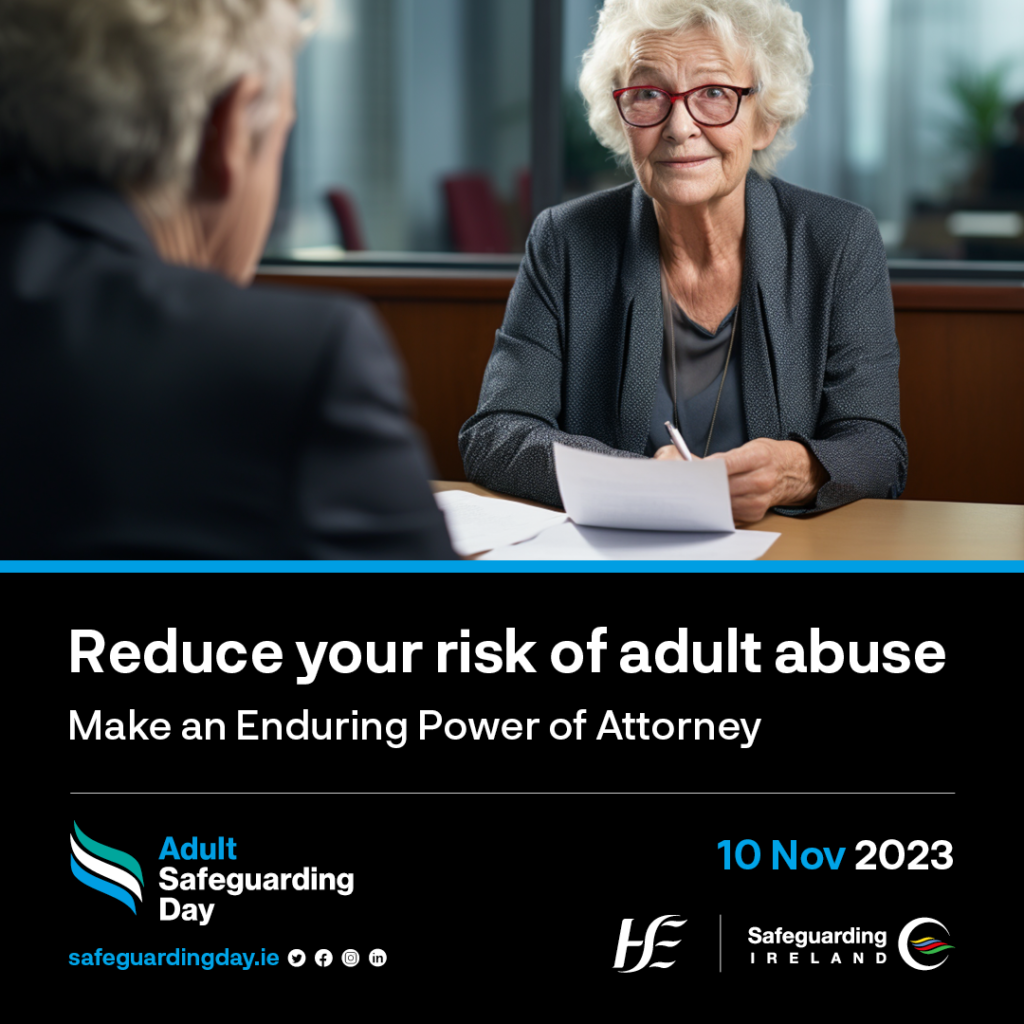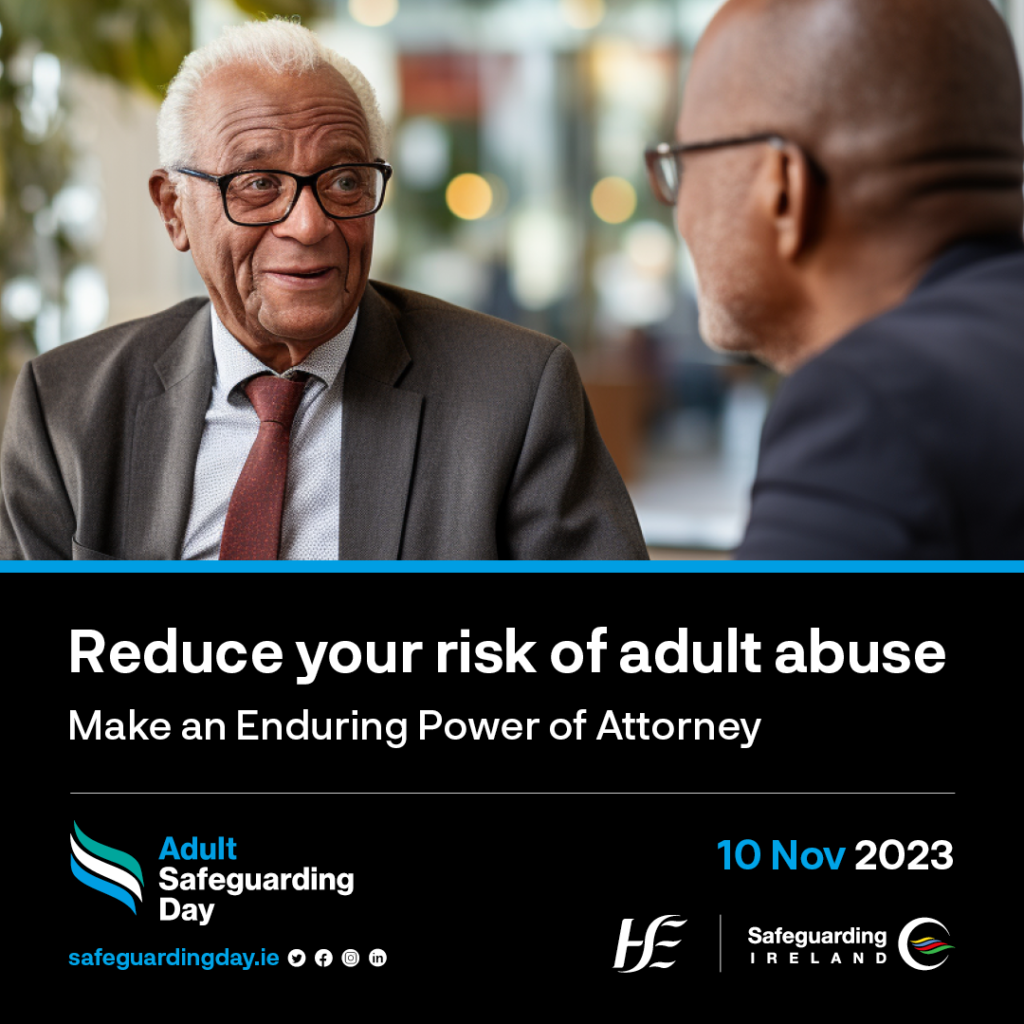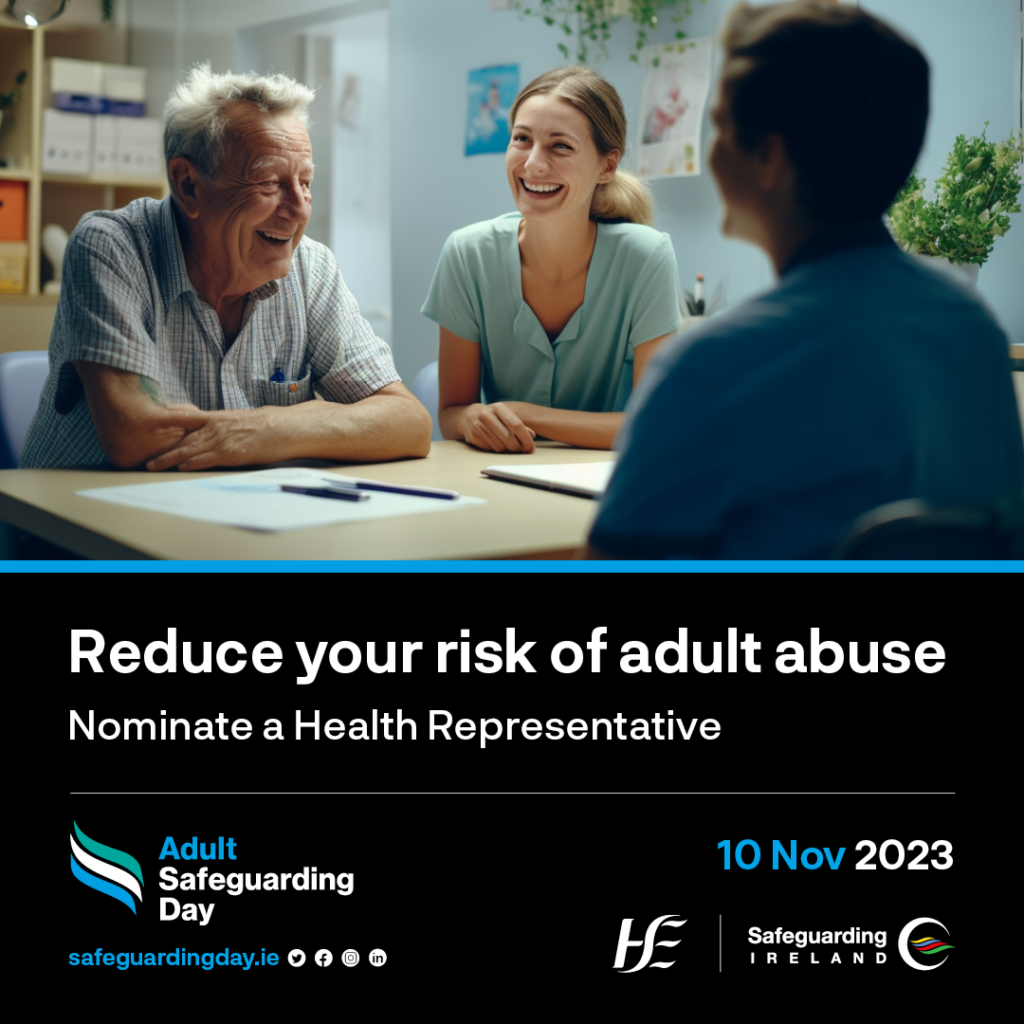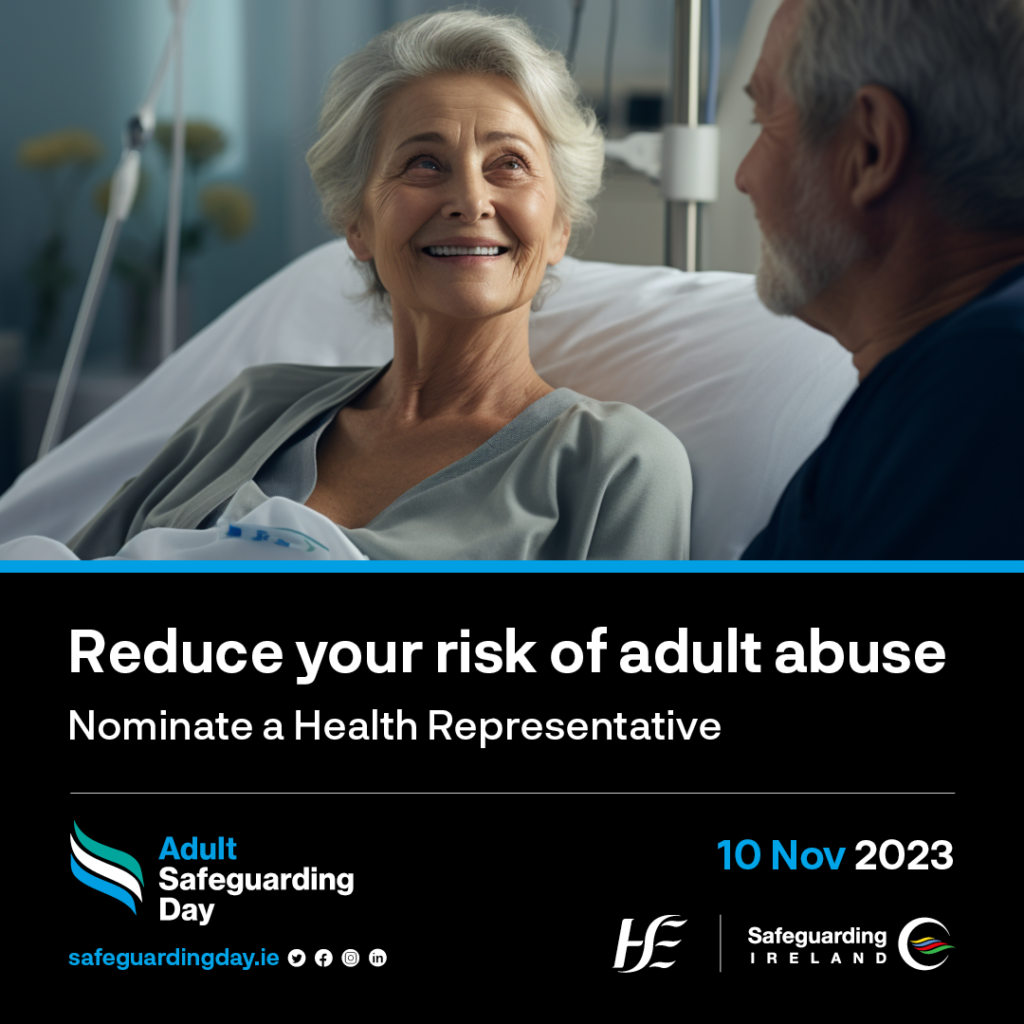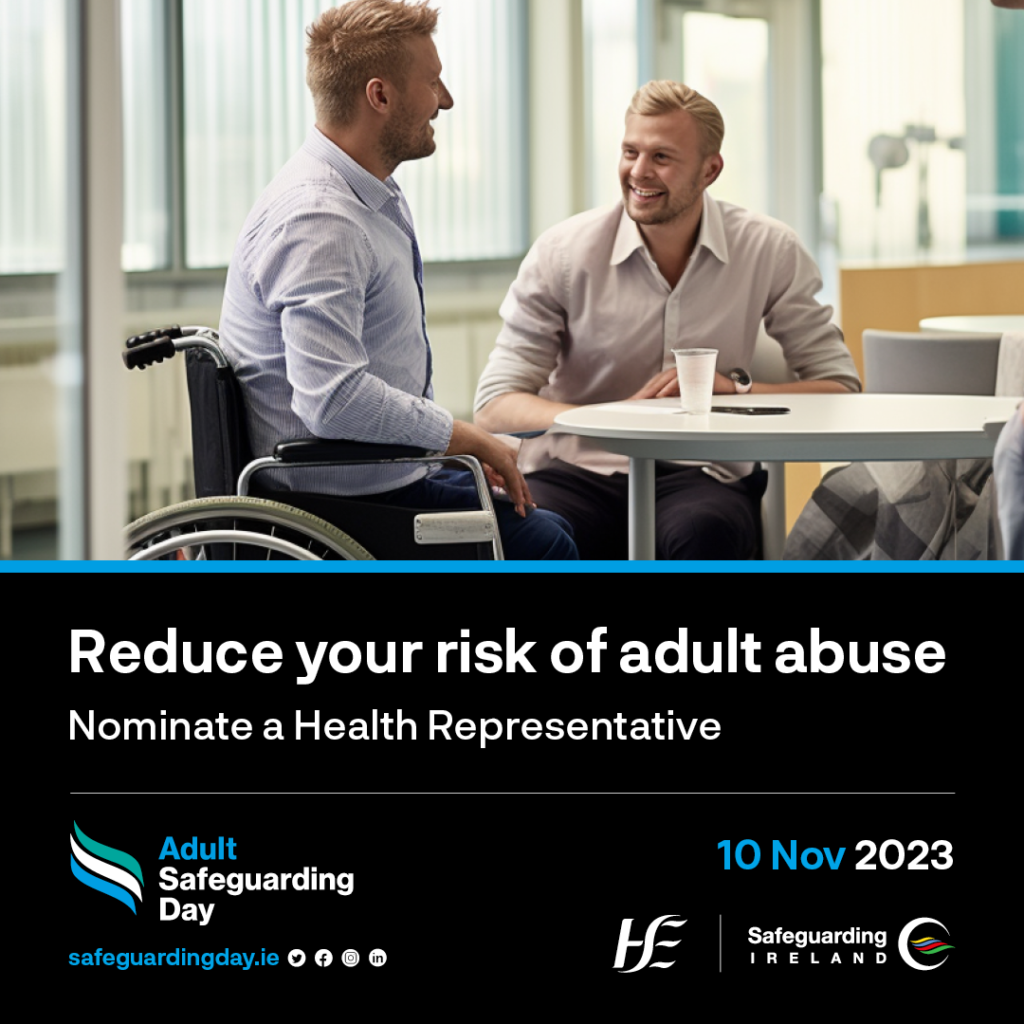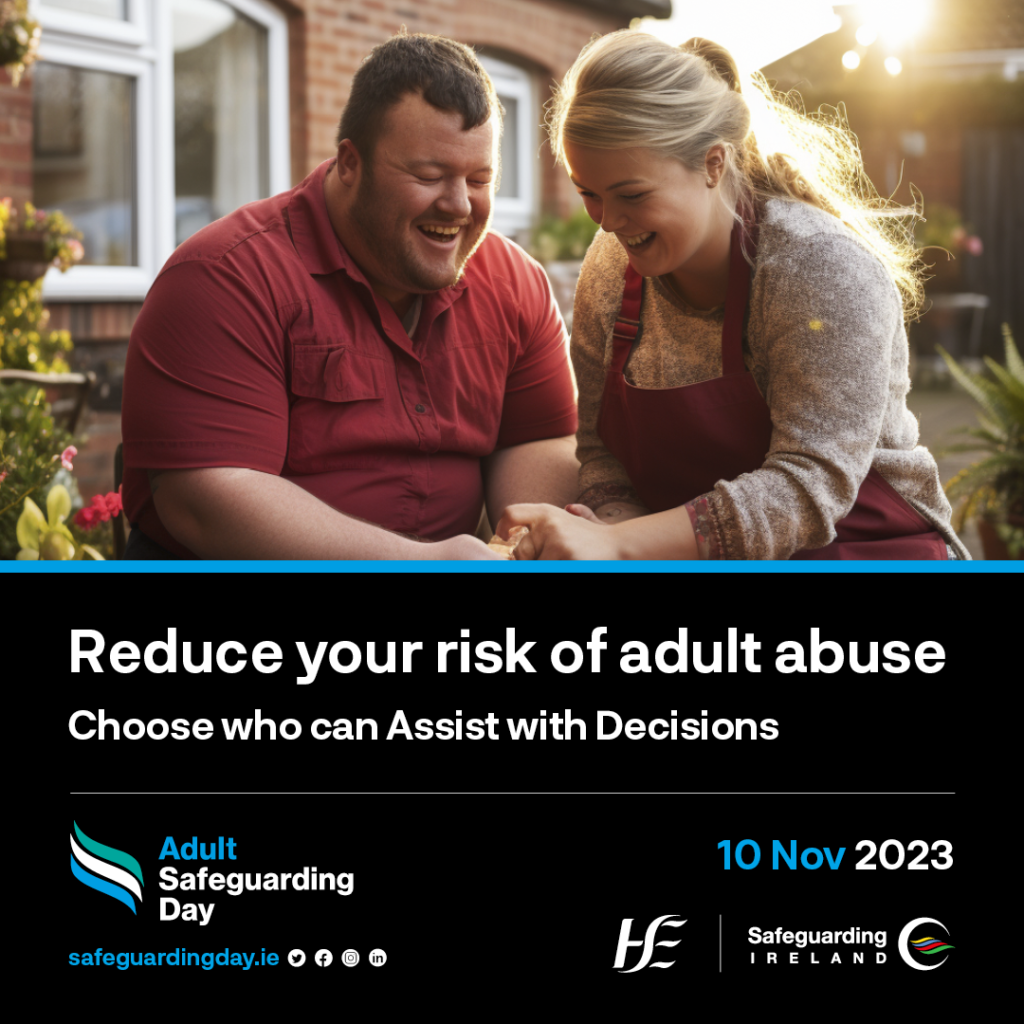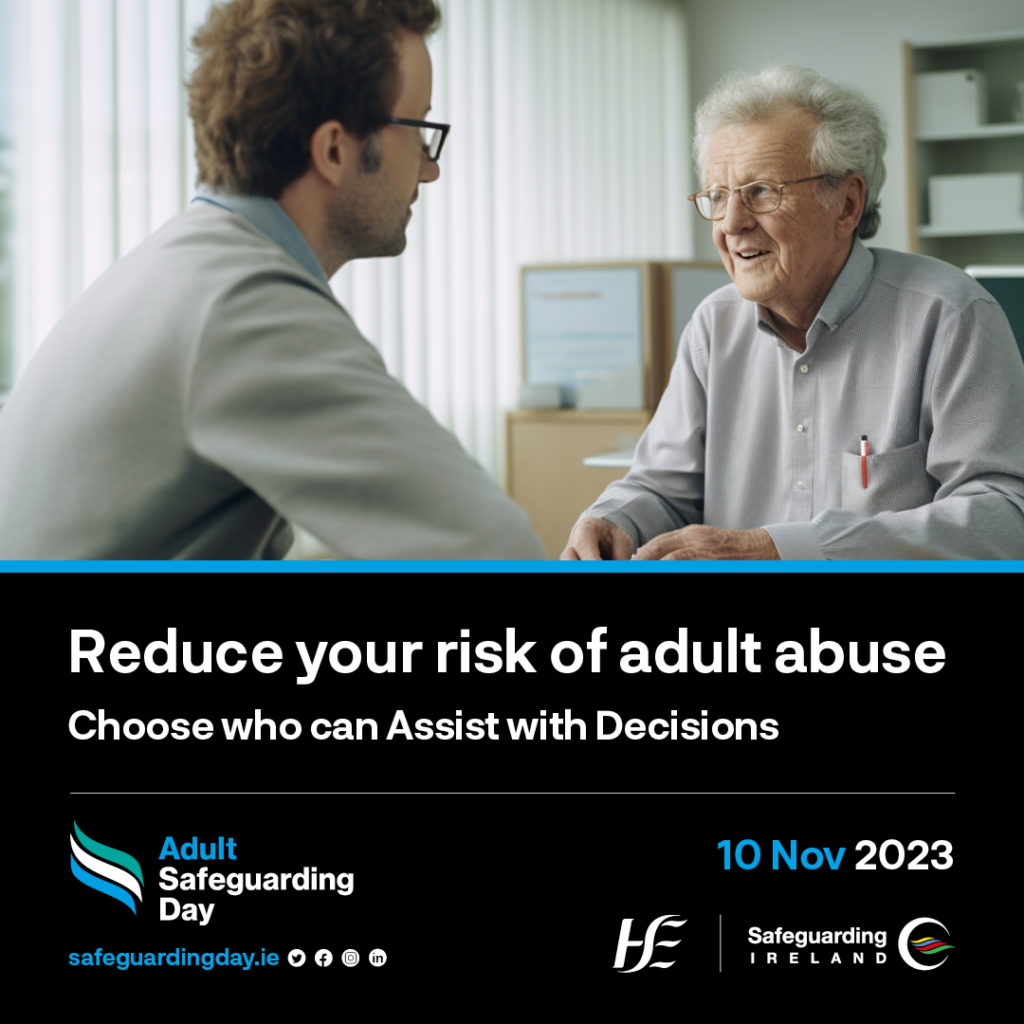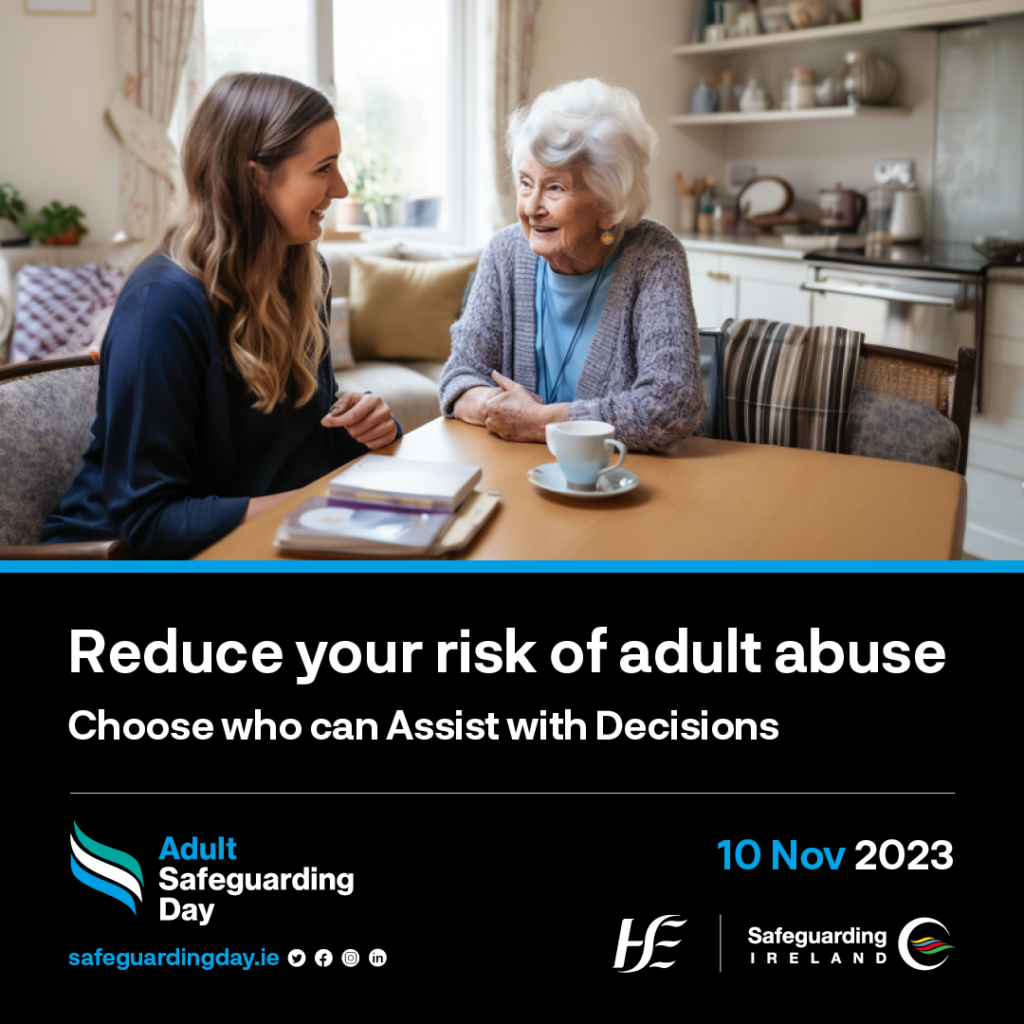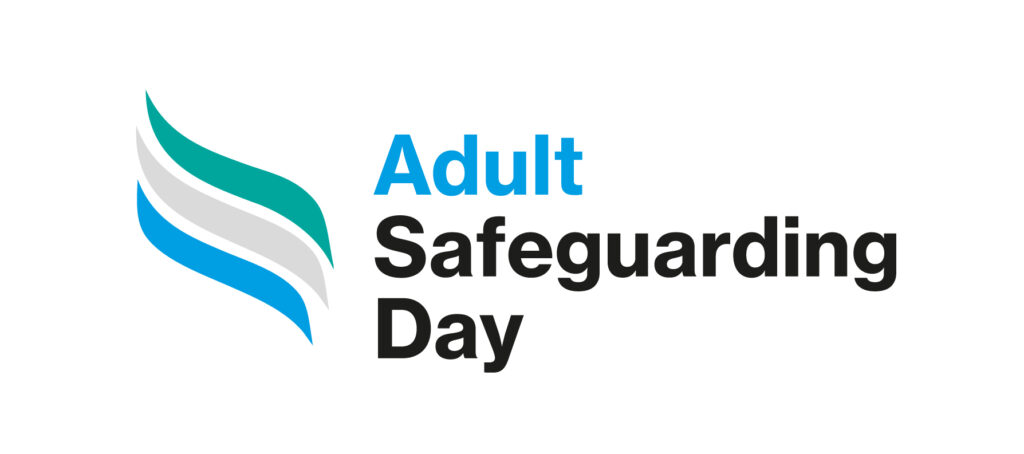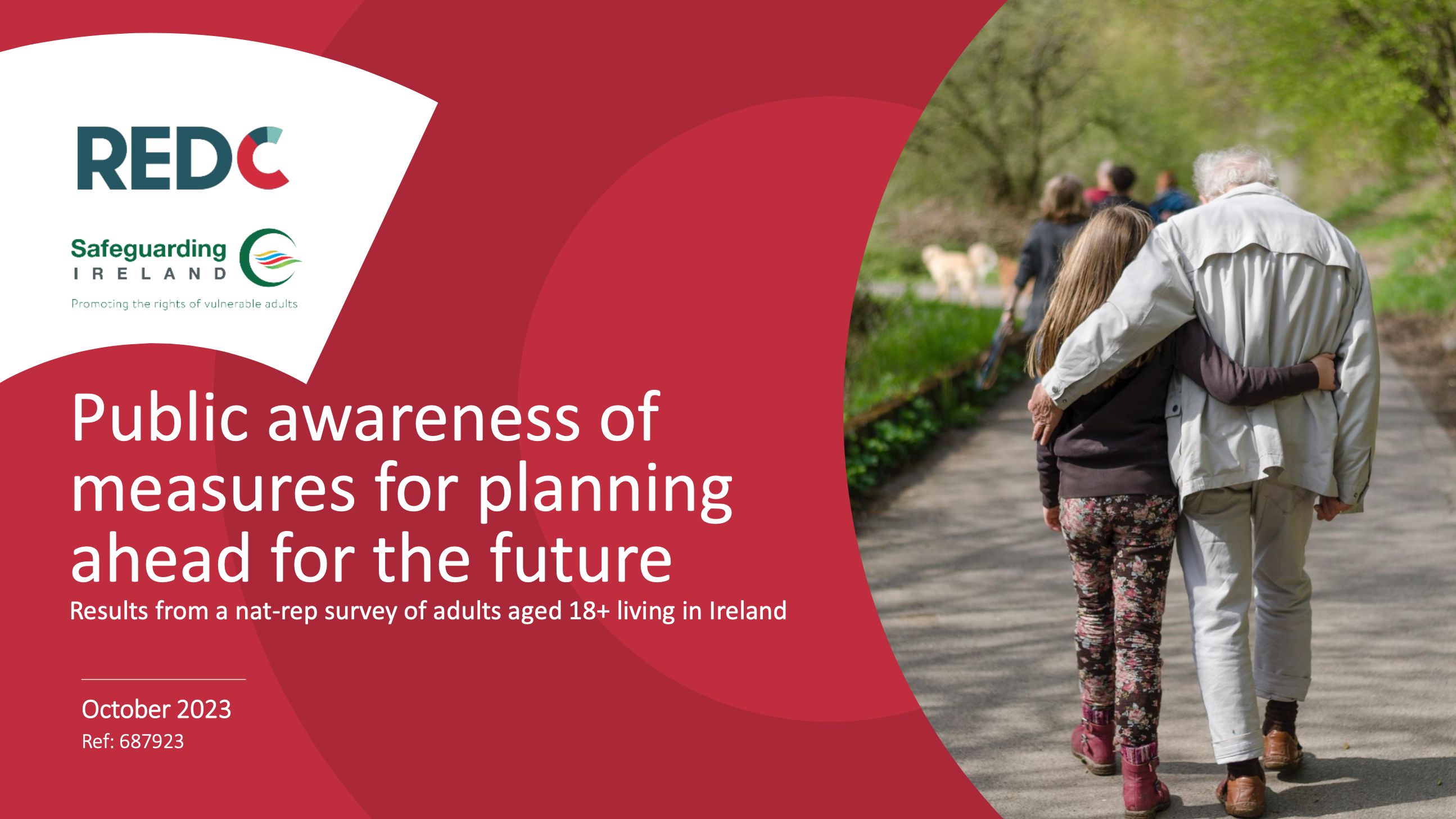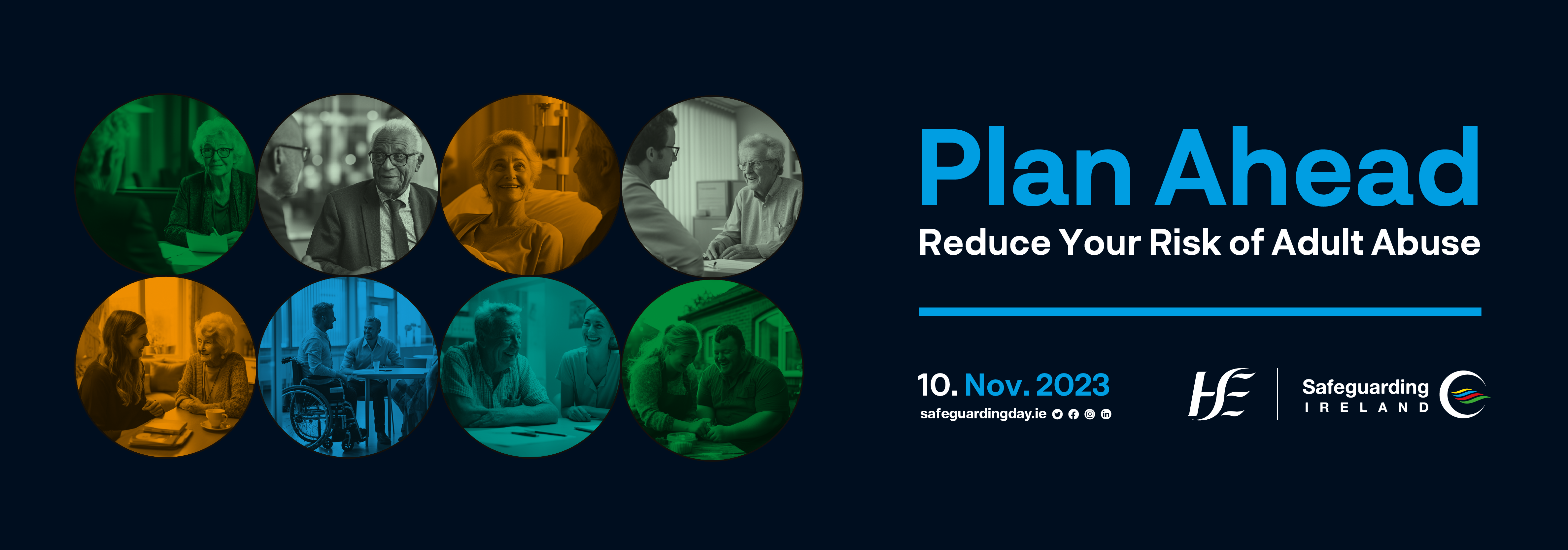
ADULT SAFEGUARDING DAY is the major annual public awareness drive of safeguarding Ireland which takes place on the second Friday of each November (Nov 8th in 2024).
It is an initiative of Safeguarding Ireland, and supported by the HSE, and will be in its fourth year in 2024. It is coordinated in partnership with organisations across the health, social, financial and justice sectors.
The aim is to raise a greater understanding of adult abuse and safeguarding.
The emphasis in the 2023 awareness drive was on ‘go to’ actions all adults can take to Plan Ahead and reduce their risk of adult abuse. READ the NEWS RELEASE
The 2023 Message was that planning ahead reduces the risk of adult abuse. And that ‘go to’ actions that all adults can take are:
- Make an Enduring Power of Attorney
- Nominate a Designated Healthcare Representative
- Choose who can Assist with Decisions
What is Safeguarding?
Safeguarding means putting measures in place to uphold our rights, to support our health and wellbeing, to reduce our risk of harm – and to empower us to protect ourselves.
Safeguarding involves ourselves, our families, services and professionals all working together to prevent and respond to adult abuse, neglect or coercive control.
Safeguarding means empowerment – that if we face challenges with our capacity, ability or independence our decisions are supported and respected.
Plan Ahead to reduce risk of Adult Abuse
Why is Planning Ahead important?
Planning ahead is important because it reduces the risk of adult abuse. It includes steps we can take to safeguard ourselves – so that our important decisions about money, property and health are clear and in the care of a person we have chosen and trust, for if ever in the future we need help.
Planning ahead not only safeguards ourselves – it also reduces potential for confusion, conflict and tension in families and helps healthcare professionals to know what treatment we would want.
More Information
- Safeguarding Ireland: www.safeguardingireland.org
- Decision Support Service: www.decisionsupportservice.ie
- Think Ahead: www.thinkahead.ie / 01 963 1161
- HSE Safeguarding Teams: www.hse.ie/safeguarding.
What is Adult Abuse?
Adult Abuse happens when a person’s rights, independence or dignity are not respected. This can be deliberate, or caused by a lack of knowledge, or omission of care. However, all circumstances of not respecting a person’s rights are abuse. There are many forms of abuse including – emotional and psychological, physical, financial, sexual, organisational, online, neglect, coercive control or discrimination.
More than 10,000 cases of alleged abuse are reported to the HSE Safeguarding and Protection Teams each year, although the actual figure (including what is not reported, or reported to other authorities) is much higher.
Abuse can affect any adult at any stage of life – but is more likely to occur at times of challenge such as living with frailty due to age, a physical or intellectual disability, an acquired brain injury, a mental health condition, or in situations of coercive control.
2023 – Videos on Planning Ahead
PLAN AHEAD – Overview: EPA, Health, Decision-making
PLAN AHEAD – An Enduring Power of Attorney
PLAN AHEAD – Advance Healthcare Directive & DHR
PLAN AHEAD – Decision Support Arrangements
PLAN AHEAD – The HSE Safeguarding Service
PLAN AHEAD – Role of the Circuit Court
3 ‘Go to’ steps to Plan Ahead
1. Make an Enduring Power of Attorney
In many countries most adults, including younger adults, have an Enduring Power of Attorney (EPA) in place. However, in Ireland few do and we need to change this.
Making an EPA involves setting out your wishes on your money and property and giving decision-making powers to a person you choose, for if ever you were no longer able to make these decisions. An EPA only comes into effect if in the future you no longer have decision-making capacity.
All adults are encouraged to put in place an Enduring Power of Attorney. In planning an EPA, Banks and An Post are available to advise on good planning of money and property.
It is a legal document and a starting point is to contact the Decision Support Service (DSS). Staff can explain what an EPA is and how to make one. You can contact the DSS at queries@decisionsupportservice.ie or call 01 211 9750.
2. Nominate a Designated Healthcare Representative
For future health decisions, you can nominate a Designated Healthcare Representative (DHR) for if in the future you no longer had decision-making capacity about health treatments or care.
When nominating a DHR, you can record your preferences on treatment, surgery, medicines or resuscitation in a document called an Advance Healthcare Directive (AHD), which is a legal document.
If in the future you are not able to make or communicate a healthcare decision, your Advance Healthcare Directive would come into effect.
Your DHR would then have the authority to act on your behalf and ensure that your AHD is followed.
You can talk with your Doctor about nominating a DHR and about making an Advance Healthcare Directive.
The Irish Hospice Foundation has a helpful resource called the Think Ahead Planning Pack which includes a template that you can follow to complete an Advance Healthcare Directive, see www.thinkahead.ie or call 01 963 1161. You can also contact the DSS at queries@decisionsupportservice.ie or call 01 211 9750.
3. Choose who can Assist with Decisions
In addition, there are three further Decision Support Arrangements that are also important to understand in case they may be relevant for you, or those close to you.
Under a new law called the Assisted Decision-Making (Capacity) Act (ADM) all services, including banks and companies, have responsibility to presume capacity and to support people to make their own independent decisions by making information and choices accessible and adaptable.
However, in circumstances when there is a challenge with decision-making and support is required – the Act includes three levels of decision-making assistance which have legal standing. The Decision Support Service (DSS) has been set up to register and supervise these arrangements.
These Decision Support Arrangements are:
- A Decision-Making Assistant can be appointed by a person to gather and explain information and communicate a decision for them. However, the person still makes the decision. The DSS and a number of people must be notified about it.
- A Co-Decision Maker can be appointed by a person to make decisions jointly with them. This arrangement can be used where a person feels unable to make decisions on their own. The agreement must be written down and registered with the DSS. Co-decision-makers make annual reports to the DSS about the decisions that have been taken under the agreement.
- A Decision-Making Representative can be appointed if a person is unable to make decisions even with help, and where there is no Enduring Power of Attorney or Advance Healthcare Directive in place. This person is appointed by the Court and can be someone trusted by the person, or from a panel maintained by the DSS. Their role is limited to the specific requirement identified by the Court and must take into account the wishes, values and beliefs of the person. It is registered with the DSS to whom the Representative reports.
More information is available by contacting the DSS.
(NOTE: Both an Enduring Power of Attorney and Designated Healthcare Representative are also legally recognised ‘Decision Support Arrangements’ under the new ADM law.)
You can contact the DSS at queries@decisionsupportservice.ie or call 01 211 9750.
Booklet and Posters
Twitter / Facebook
Instagram / Linkedin
RESPOND to Adult Abuse – REPORT it
If you are suffering abuse, neglect or coercive control, or this is happening to someone you know, the best thing to do is report it. Depending on each circumstance, different responses are recommended:
- If there is an immediate risk or danger call the Gardaí at 999 or 112.
- If there is mistreatment which is serious, but it is not an immediate danger, report it urgently to the local Garda station (directory of stations at www.garda.ie), or call the Garda confidential line at 1800 666 111
- For an ongoing safeguarding concern that needs support, contact the local HSE Safeguarding and Protection Team. There are safeguarding and protection teams covering all regions in the country, and the contact details are at www.hse.ie/safeguarding
- Complaints about appointed decision supporters can be investigated by The Decision Support Service at complaints@decisionsupportservice.ie or 01 211 9750
- There are also many support services and telephone helplines for abuse, neglect and coercive control which can be found online.
2022 – Videos on Preventing Adult Abuse
SAFEGUARDING: Prevent Adult Abuse – Decision-Making.
SAFEGUARDING: Respond to Adult Abuse – the HSE.
SAFEGUARDING: Respond to Adult Abuse – the Gardaí.
SAFEGUARDING: An Independent Safeguarding Authority.
2021 – Videos on Adult Abuse & Safeguarding
What is Adult Safeguarding
Type of Adult Abuse
Institutional Abuse
Safeguarding Adults with Disabilities
Planning Ahead – Financial
Planning Ahead – Healthcare
Financial Abuse – Banking
Financial Abuse – Money and Budgeting
